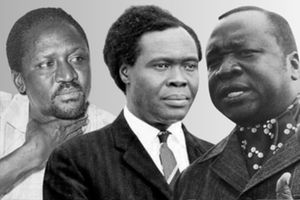
Kenyan activist Boniface Mwangi (right) and Ugandan activist Agather Atuhaire.
Last week Kenyan activist Boniface Mwangi and Ugandan lawyer and activist Agather Atuhaire endured brutal mistreatment during their detention by Tanzanian authorities. They had travelled to Dar es Salaam to witness the treason trial of opposition leader Tundu Lissu, a persistent critic of President Samia Suluhu Hassan’s government.
Upon release, Mwangi reported that both he and Atuhaire had been tortured under the orders of a Tanzanian state security official. Mwangi was later dumped near the Kenyan border, while Atuhaire was dropped near the Tanzania-Uganda Mutukula crossing. Both bore signs of physical abuse. I spoke to Atuhaire after her release; she confirmed they had been tortured, and that she had been sexually assaulted.
They were blindfolded most of the time. On one of the few occasions when their blindfolds were removed, it was so they could be photographed —naked. It was blackmail. Their tormentors told them that if they spoke about their torture, the humiliating photos and videos would be made public.
Their arrest happened amid a broader crackdown on opposition figures and civic actors in Tanzania. Lissu, the target of the trial they came to observe, was arrested in April after calling for electoral reforms. His arrest and the subsequent treatment of his supporters have sparked concerns about a renewed authoritarian turn ahead of the October elections.
President Suluhu’s administration had been praised early in her tenure for relaxing the excesses of her dead predecessor John Magufuli. But her honeymoon is over. There has been growing criticism for increasing repression: detentions, silencing of dissent and unexplained disappearances.
Tanzania’s democratic credentials
The treatment of Mwangi and Atuhaire magnified the scrutiny of Tanzania’s democratic credentials. But there’s also something else. For decades, Tanzania was regarded as one of Africa’s more temperate lands—even under one-party rule. This episode felt jarringly un-Tanzanian.
Tanzania is among a shrinking handful of countries in Africa that have never had a successful post-independence military coup, civil war, or even brief national political bloodshed, like Kenya’s post-election violence in 2008. Others in that rare club include Botswana, Cape Verde, Mauritius, Namibia, Eritrea, Eswatini, Malawi, Senegal and Morocco.
In the official narrative, Mwangi, Atuhaire and other activists who had come to observe Lissu’s trial were painted as foreign agitators from “troubled” countries out to destabilise Tanzania’s peace. Yes, Tanzania is currently one of the most stable countries on the continent. But stability and torture don’t walk hand in hand. Even if it felt threatened, deportation would have sufficed. Why didn’t it?
The answer lies partly in Tanzania’s unresolved contradictions. The union between mainland Tanganyika and Zanzibar, created in 1964, remains one of the country’s most politically sensitive fault lines. The 2000 elections in Zanzibar were marked by gross irregularities — voter suppression and ballot stuffing, especially in opposition strongholds.
The Civic United Front (CUF), Zanzibar’s main opposition party, claimed the elections were rigged in CCM’s favour. On January 26, 2001, CUF staged demonstrations demanding electoral reforms and recognition of their win. Tanzanian security forces opened fire. At least 30 to 40 people were kille — though rights groups say the real number was higher. Dozens were wounded and hundreds were arrested. Over 2,000 people fled Zanzibar. Some made it to Kenya by boat. A small group even settled in Mogadishu.
In power since independence
That was Tanzania’s most violent political episode since independence. It exposed the raw tensions between Zanzibar and the mainland. It led to the Muafaka Agreements between CCM and CUF, intended to facilitate political reconciliation. But little changed. The memory of that fragility still haunts the establishment. Anything that might awaken the ghosts of 2001 sets off alarms in the State’s paranoid quarters.
Tanzania also illustrates how long-standing one-party dominance corrodes democracy. The ruling party, CCM, has been in power since independence in 1961— first as Tanu. It is the continent’s longest continuously ruling party. Real power has never changed hands. Elections in Tanzania are less about alternatives and more about managing elite succession within CCM. Over time, a party in power this long colonises the State. The ruling party becomes the chief employer, opportunity broker and guardian of patronage. The State becomes the party, and vice versa.
And the longer a party rules, the more it leans on surveillance, coercion and propaganda rather than popular consent. Civic space shrinks. It becomes a security State, not a democratic one. Without political rotation or meaningful checks, power self-perpetuates. Long-term rule nurtures clientelism, cronyism and elite capture. The outward calm masks old grievances — ethnic divisions, regional marginalisation, growing inequality. When the system finally cracks, there are no alternate power structures to carry the country through peacefully.
Unless deep internal reforms are made, long-ruling parties tend to age poorly. CCM understands this. That’s what makes it dangerous.
The author is a journalist, writer, and curator of the “Wall of Great Africans”. X@cobbo3.







